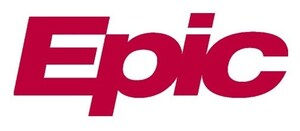REDMOND, Wash., and VERONA, Wis., April 17, 2023 /PRNewswire/ -- Microsoft Corp. and Epic on Monday announced they are expanding their long-standing strategic collaboration to develop and integrate generative AI into healthcare by combining the scale and power of Azure OpenAI Service1 with Epic's industry-leading electronic health record (EHR) software. The collaboration expands the long-standing partnership, which includes enabling organizations to run Epic environments on the Microsoft Azure cloud platform.
This co-innovation is focused on delivering a comprehensive array of generative AI- powered solutions integrated with Epic's EHR to increase productivity, enhance patient care and improve financial integrity of health systems globally. One of the initial solutions is already underway, with UC San Diego Health, UW Health in Madison, Wisconsin, and Stanford Health Care among the first organizations starting to deploy enhancements to automatically draft message responses.
"A good use of technology simplifies things related to workforce and workflow," said Chero Goswami, chief information officer at UW Health. "Integrating generative AI into some of our daily workflows will increase productivity for many of our providers, allowing them to focus on the clinical duties that truly require their attention."
Another solution will bring natural language queries and interactive data analysis to SlicerDicer, Epic's self-service reporting tool, helping clinical leaders explore data in a conversational and intuitive way.
"Our exploration of OpenAI's GPT-4 has shown the potential to increase the power and accessibility of self-service reporting through SlicerDicer, making it easier for healthcare organizations to identify operational improvements, including ways to reduce costs and to find answers to questions locally and in a broader context," said Seth Hain, senior vice president of research and development at Epic.
Leading industry experts have highlighted the urgent need for health systems and hospitals to address intense pressures on costs and margins. Approximately half of U.S. hospitals finished 2022 with negative margins as widespread workforce shortages and increased labor expenses, as well as supply disruptions and inflationary effects, caused expenses to meaningfully outpace revenue increases.2 Industry participants recognize that achieving long-term financial sustainability through increased productivity and technological efficiency is a mission-critical strategic priority.3
"The urgent and critical challenges facing healthcare systems and their providers demand a comprehensive approach combining Azure OpenAI Service with Epic's industry-leading technology," said Eric Boyd, corporate vice president, AI Platform, Microsoft. "Our expanded partnership builds on a long history of collaboration between Microsoft, Nuance and Epic, including our work to help healthcare organizations migrate their Epic environments to Azure. Together we can help providers deliver significant clinical and business outcomes leveraging the power of the Microsoft Cloud and Epic."
When creating technologies that can change the world, Microsoft believes organizations need to ensure that the technology is used responsibly. Microsoft is committed to creating responsible AI by design that is guided by a core set of principles: fairness, reliability and safety, privacy and security, inclusiveness, transparency, and accountability. Microsoft is putting those principles into practice across the company to develop and deploy AI that will have a positive impact on society, taking a cross-company approach through cutting-edge research, best-of-breed engineering systems, and excellence in policy and governance.
Visit the Microsoft, Nuance and Epic booths at the 2023 HIMSS Global Health Conference in Chicago to learn more about new and enhanced AI-powered solutions and areas of shared innovation.
About Epic
Epic develops software to help people get well, help people stay well, and help future generations be healthier. Visit www.epic.com/about.
About Microsoft
Microsoft (Nasdaq "MSFT" @microsoft) enables digital transformation for the era of an intelligent cloud and an intelligent edge. Its mission is to empower every person and every organization on the planet to achieve more.
1 Azure and Azure OpenAI Service, including any of its component technologies, is intended for general-purpose use and is not intended or made available: (1) as a medical device; (2) for the diagnosis of disease or other conditions, or in the cure, mitigation, treatment or prevention of a disease; or (3) as a substitute for the professional clinical advice, opinion, or judgment of a treating healthcare professional. Azure and Azure OpenAI Service has not been evaluated by the U.S. FDA or similar regulatory agency as a medical device, and users of Azure and Azure OpenAI Service are responsible for ensuring the regulatory compliance of their use or any solution they build using Azure and Azure OpenAI
2 "National Hospital Flash Report," report by Kaufman Hall, January 2023; "The Current State of Hospital Finances: Fall 2022 Update," report by the American Hospital Association, Sept. 15, 2022
3 "Health Care Has a Purpose and Productivity Crisis," report by Boston Consulting Group, Dec. 5, 2022; "2023 forecast: 7 immediate and long-term priorities for hospital leaders," Fierce Healthcare, Dec. 21, 2022; "Positioning for Competitive Advantage and Financial Resilience," Health Management Academy, February 2022.
Note to editors: For more information, news and perspectives from Microsoft, please visit the Microsoft News Center at http://news.microsoft.com. Web links, telephone numbers and titles were correct at time of publication but may have changed. For additional assistance, journalists and analysts may contact Microsoft's Rapid Response Team or other appropriate contacts listed at https://news.microsoft.com/microsoft-public-relations-contacts.
SOURCE Epic

WANT YOUR COMPANY'S NEWS FEATURED ON PRNEWSWIRE.COM?
Newsrooms &
Influencers
Digital Media
Outlets
Journalists
Opted In





Share this article